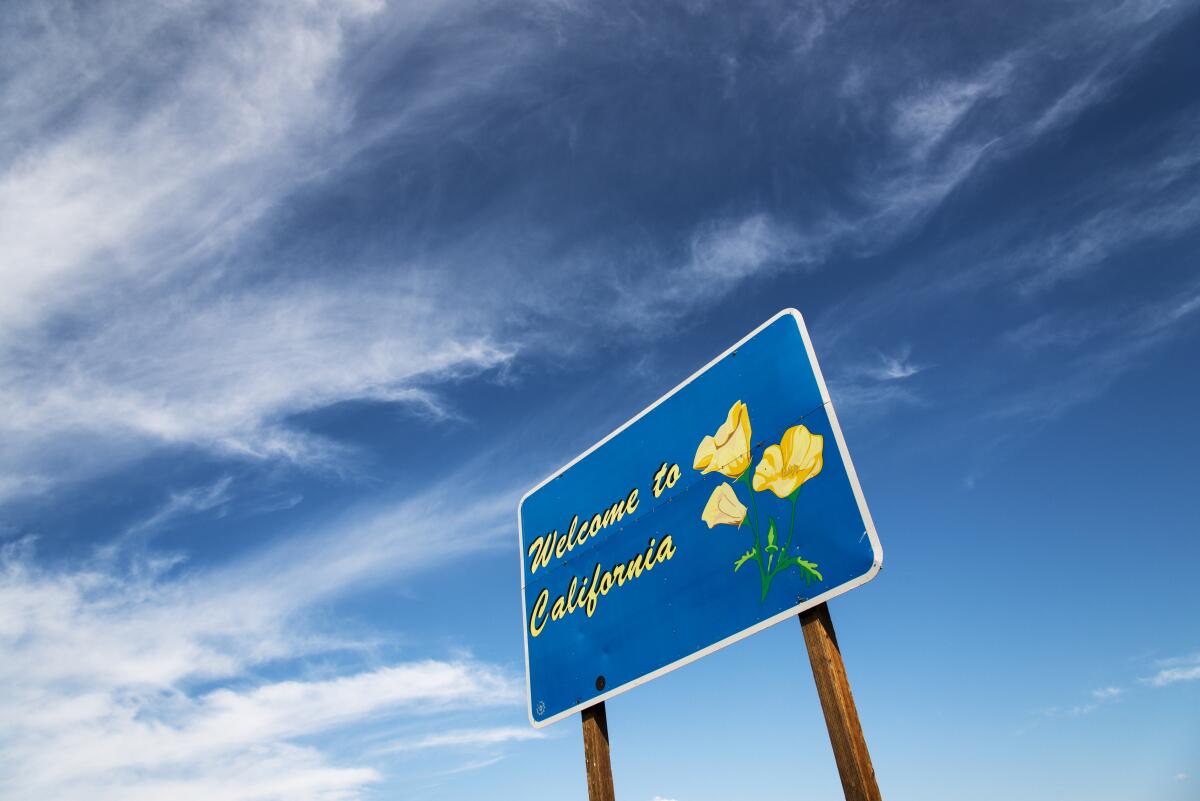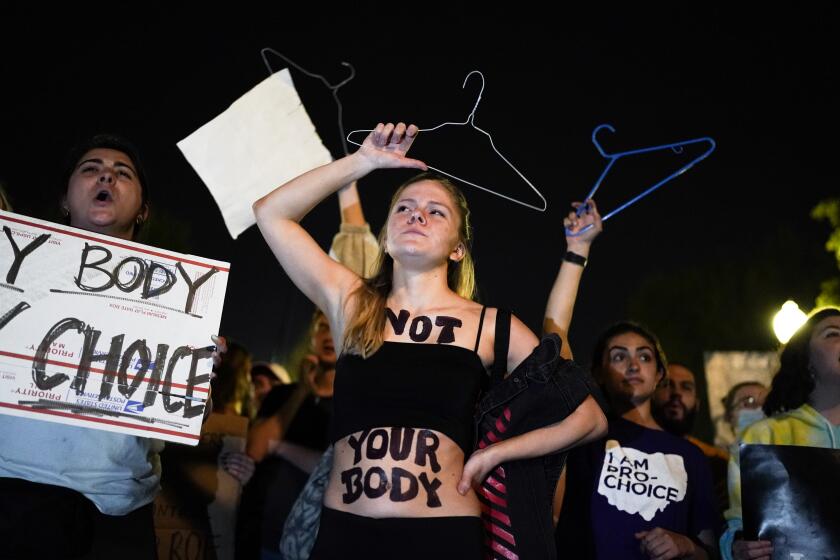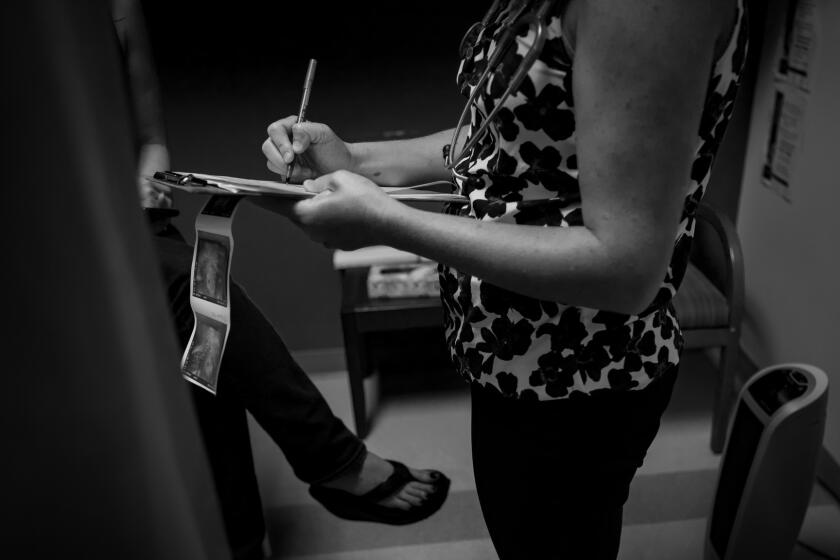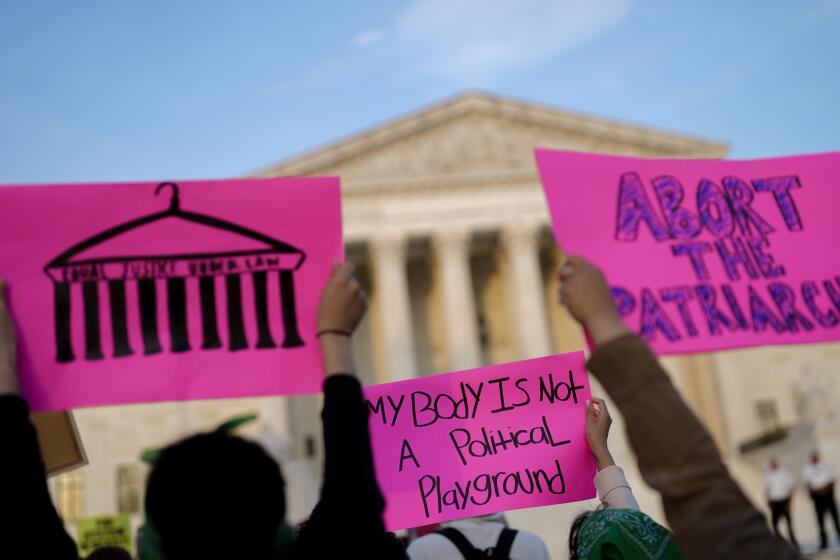Column: A Texas woman sought an abortion. Here’s how far California went to help her

The first sign of Stephanie’s pregnancy was nausea, as it so often is — that particular debilitating queasiness that knocked her off her feet, sometimes all day, days at a time.
It kept Stephanie, who asked me not to use her real name for all the obvious reasons, from working. She runs her own business in Austin, Texas, braiding hair, a skill she learned as a teenager.
“Men, women, children,” she told me with a Lone Star twang. “Yes, ma’am,” she does them all and loves it, loves making her customers feel beautiful.
When Stephanie took a pregnancy test and it came back positive, she was shocked at first, then dismayed. Then things got worse.
Though she hadn’t thought much about it, Texas had just passed its law banning abortions after cardiac activity is found. California, the Golden State of both sunshine and liberty, has of course doubled down on access to reproductive health — also something Stephanie wasn’t yet thinking about.
Stephanie had been dating a man who had been a friend for a few years. They met at a restaurant during a Sunday lunch, and in retrospect, Stephanie wishes she’d kept him “in the friend zone.” As soon as she knew she was pregnant, she also knew he wasn’t someone she wanted to be in a long-term relationship with. He was never going to be the kind of partner she could count on, and she didn’t need more of that.
Defiant state leaders stood ready Tuesday to protect residents and nonresidents alike from any federal rollbacks of abortion rights.
“Dealing with him, that would have brought a lot of negative problems in my life,” she said.
She has three children, ages 14, 6 and 5. She’s a single mom with all the hard work that comes with it, but “my kids are my main priority,” she says.
The youngest is a “dancing machine” who will start kindergarten soon, a little girl with a big personality. Her 6-year-old is the comedian, a clown, she says, with a helpful side.
Her teenage daughter dreams of being a nurse who works with babies. The young girl thinks being a RN will give her a life of luxury, Stephanie says.
That may not work out quite how the teen thinks, but Stephanie is proud of her drive. “She’s a go-getter, very mature,” she says.
Stephanie, 33, prayed about the pregnancy. She ran through her savings being off work. She thought about the bills a baby would bring, what it would mean for her kids, and for her own future. Then she decided to have an abortion.
“Where I am at in my life, I am on a journey where I am still trying to find myself, trying to be the best mother I can be,” she said. “And I feel like it’s hard enough already and I don’t want to bring another child into this world.”
This is of course none of our business, and requires no justification, no back story to make us understand a choice that is hers alone. But Stephanie shared her story with me both to help explain what it really means for California to be a sanctuary state for abortion — how urgent it is that this state keep the promises its politicians are making —and to let others in need of an abortion know that there is help in these dark and frightening days.
What Planned Parenthood Los Angeles did to help Stephanie, the lengths it went to, surprised me. It made me proud to be in a state that isn’t backing down from this ugly fight, and it made me realize that we are far beyond putting on pink hats and protesting at a statehouse where the governor and legislators already have doubled down on making California a sanctuary for reproductive care.
This is no longer just a culture war between those with political and ideological differences, if it ever was. This is a crisis of identity that will determine the future of this country for decades to come, a dividing line between inclusive democracy and a white Christian nationalism that is seeking, successfully for now, to domino our rights one by one in a vicious fight to keep power for a few at the expense of equality and equity for most. It is racist, sexist, hate-filled and un-American.
I asked Erwin Chemerinsky, one of the nation’s preeminent constitutional scholars and a professor at UC Berkeley, where we are headed if the leaked Roe decision becomes law. His assessment was bleak.
“Justice Alito’s opinion, assuming it becomes the final decision, will put many rights in danger,” he said.
“The right to custody of one’s children, the right to keep the family together, the right of parents to control the upbringing of their children, the right to purchase and use contraceptives, the right of consenting adults to engage in same-sex sexual activity, the right of competent adults to refuse medical treatment,” all of those will be vulnerable, he warned.
He predicts that if Roe is overruled, states will “adopt laws prohibiting contraceptives that act after conception, like the IUD, the morning after pill, some birth control pills. They will outlaw IVF where embryos are not implanted. They will prohibit women from leaving a state for an abortion, and more.”
Stephanie knows exactly what that oppression feels like.
After the positive test, she went to a Texas clinic. She was only about six weeks pregnant, but they found cardiac activity, and that was that. Suddenly the Texas law was about her, and her future narrowed down to panic and fear.
“Before I went through this situation, I really didn’t care,” she said of the Texas law. “But then when it affected me, it was like, ‘Oh, s—.’”
She said the clinic basically kicked her out. She was crying, and she went back inside to ask if they knew anyone who could help her. The answer was a hard no. Luckily, a friend persuaded her to call Planned Parenthood in Texas that day, and that clinic got her in touch with the Los Angeles office. She said she was thinking there was no way she could get to California, but her friend told her to make the call anyway, a last-ditch hope.
“Immediately they were so helpful,” Stephanie said. “They were concerned. They made me feel good in that moment. Everybody down here just turns up their nose.”
The coordinator who handled her call got to work, Stephanie said. Planned Parenthood booked her flights between Texas and L.A. — 1,242 miles each way — and paid for them. It arranged transportation and a hotel — and paid for those, too. They even gave her money to pay for incidentals such as food.
But it was the way they made her feel that she remembers most, “like it wasn’t an embarrassment or a shame,” she said.
She was at the lowest point in her life and she found “love from strangers,” she said.
She flew in on a Monday and had the procedure on a Tuesday, then headed home to her kids the next day. No complications, no drama.
“I didn’t expect all this,” she said. And that’s why she’s willing to talk about it. She thinks the Texas law is “trash” but California welcomes those in need.
“I want people to know that in this life you cannot judge anyone,” she said. “I also want people to know there is help and support out there. Don’t feel alone, don’t feel embarrassed, do what’s best for you.”
She — a smart, resourceful adult — barely figured out how to get access to the reproductive care she needed. She thinks about a 14-year-old girl too scared to tell her mom she’s knocked up, or a mom who just can’t figure out where to go for help when that daughter does come to her.
It doesn’t have to be rape or incest. We don’t need the horror stories or worst-case scenarios. Thousands of women, girls and transgender people find out they are pregnant every day, with thousands of back stories that are none of our business.
But the fact that they no longer have choices in states such as Texas and Oklahoma — or even know where to go for help — should be everyone’s business.
Sue Dunlap, the head of Planned Parenthood L.A., told me they see about 100 people a month from outside the state for reproductive care. Across California, clinics are gearing up to help many more than that, possibly several hundred per week at the bigger facilities.
The state Legislature is working to increase access to reproductive care by allowing more types of medical professionals to handle abortions, and by creating state funds that would help cover costs. Organizations like Planned Parenthood are collecting money and marshaling resources.
Dunlap didn’t want to call it an underground railroad for reproductive care, maybe for all the harsh history that term holds, but I’ll call it that. That’s how far backward the current moment is, and how steeped in past racism it is — because a lack of access to abortion hits Black and brown people the most, and hurts those who are poor and marginalized with greater brutality.
Abortion activists on both sides were preparing for an election battle, but the leak of Supreme Court draft opinion on Roe vs. Wade has sped up plans.
If you do nothing else, I hope you will share Stephanie’s story far and wide, so that others in need of reproductive care know the help here is real.
Even Stephanie still can’t quite believe what California did for her, and her family.
“I didn’t expect all this,” she said.
None of us did, but here we are. And while fighting to help individuals such as Stephanie is critical, we have to be real about how much is at stake. California might prefer to focus on its own needs, but as a leader of civil rights, it is being thrust into a national role of protecting the vulnerable — whoever they may be.
It pains me to end a reproductive rights column with a quote from someone without a uterus. But credit where credit is due.
“Pay attention, America, “ Gov. Gavin Newsom said this week, speaking outside Planned Parenthood Los Angeles.
“They’re coming after you next.”
More to Read
Sign up for Essential California
The most important California stories and recommendations in your inbox every morning.
You may occasionally receive promotional content from the Los Angeles Times.














